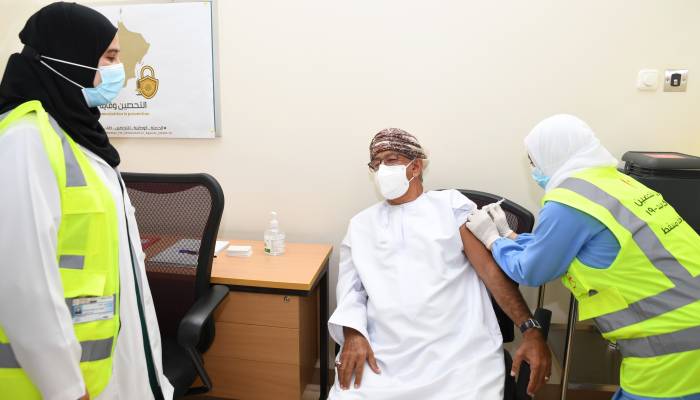
Muscat: Oman’s Minister of Health Dr Ahmed Mohammed Al Saidi launched the National Campaign for Immunisation against COVID-19 under the theme (Immunisation Is a Prevention) at Seeb Specialised Polyclinic yesterday.
Several undersecretaries of the ministry, as well as healthcare workers were present on the occasion. Among the first to be vaccinated were Dr John Jabbour, the Representative of the World Health Organization in Oman, frontline healthcare workers in the country, and members of the community.
Vaccination will take place in two stages. The technical team from the ministry has identified the target groups to be given the vaccine in the first phase.
They include the elderly, aged above 65 years, those with diabetes, people with kidney failure and those on dialysis, and those with chronic lung diseases, such as chronic obstructive pulmonary syndrome (COPD), asthma, and interstitial lung disease.
Target groups of healthcare workers include ICU staff, those working in COVID-19 wards, employees with conditions such as diabetes, obesity (with a BMI more than or equal to 40), chronic lung disease, and those on dialysis.
Given the urgent need for COVID-19 vaccines, unprecedented financial investments and scientific collaborations were involved in the development process, while still maintaining strict clinical and safety standards.
“We want to vaccinate 60 per cent of our population: Omanis and non-Omanis,” said the Minister of Health. “The Ministry has put criteria on who should receive vaccines on a priority basis. We received the first shipment of vaccines on Thursday, December 24.
“Unfortunately, we did not get as many doses of the vaccine as we wanted, i.e. 15,600 doses,” he added.
“This will cover about 7,500 individuals. It takes a long time to make these vaccines, and I can understand some people are worried that we should have rushed to acquire them.
“But I want to assure everybody that while making these vaccines in a short period of time, safety or their efficacy are not compromised,” the minister went on to say.
“They went through exactly the same steps – the three clinical trials were conducted the same way, the number of participants in these trials was also high enough to reach the statistical efficacy that we are looking for.”
Concerning the vaccine’s side effects, Dr Saif Al Abri, the Director General of Disease Control and Surveillance, said these included local pain, redness and swelling at the injection site, and fever, which are the same symptoms associated with taking any other vaccines.
“Some other side effects have been recorded in low proportions, such as sore throat, nausea, joint pain and general fatigue, which indicate that the body’s immune system is beginning to respond to the vaccine,” he added. “He affirmed that no serious side effects were recorded during the clinical trial phase.
“Getting the vaccine will not cancel the need of other preventive measures,” added Al Abri.
“It will be complementary to other preventive measures, as the vaccine will not target all of the population at once. This means there will always be high-risk people around us who could get the infection, unless we comply with preventive measures.”
Those selected for vaccination are required to be proactive and report to the required health institution, as soon as they have been asked to do so. The second dose of the vaccine will be given to these people 21 days after the first, as a single dose of the vaccine is considered ineffective. The impact of the vaccine will be felt a week after the second dose has been administered.
Taking the vaccine will not be mandatory, but rather, is based on the conviction of individuals in the community, which reflects a sense of awareness and promotion of a sense of responsibility and national duty.
“We will try to also make some available, as soon as we can secure enough vaccines, to the private sector,” the Minister of Health said. “This is for those who don’t want to follow the priorities designated by the ministry.
“The arrival of the vaccine would not have been possible without the full support of His Majesty Sultan Haitham Bin Tarik, who has been following all the happenings regarding this pandemic, and he has been very supportive since the beginning,” added Al Saidi.
“Thanks to His Majesty, thanks to all my colleagues in the healthcare sector, thanks to all of my colleagues in the media, for spreading this news.”
With the ongoing COVID-19 pandemic and the challenges it has imposed, measures such as social distancing and the closure of activities and border crossing posts have become a major challenge for governments and individuals. Solutions have therefore been limited to strengthening preventive measures among community members, institutions and public places, as well as the provision of effective vaccines.
As part of Oman’s efforts to respond to the COVID-19 pandemic, one of its top priorities was to ensure the country receives its share of the vaccine.
This was done through the formation of a working group headed by MoH’s Undersecretary of Health Affairs, with the membership of the Director General of Disease Control and Surveillance, the Director General of Medical Supplies, the Director General of Primary Health Care, and the Director General of Pharmaceutical Affairs and Drug Control, in addition to the Director of Communicable Diseases of the Directorate General for Disease Surveillance and Control.